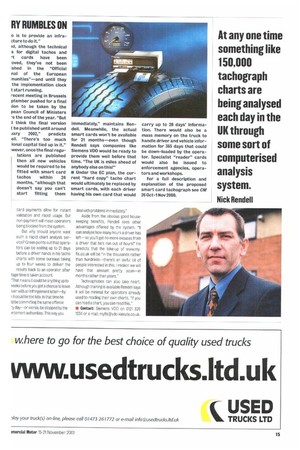RY RUMBLES ON
Page 15

If you've noticed an error in this article please click here to report it so we can fix it.
o is to provide an infracture to do it." id, although the technical S for digital tachos and • cards have been
.oved, they've not been Ished in the "Official nal of the European munities"—and until they the implementation clock t start running.
recent meeting in Brussels ptember pushed for a final ;ion to be taken by the pean Council of Ministers -e the end of the year. "But II think the final version t be published until around Jary 2002," predicts ell. "There's too much ional capital tied up in it." ,wever, once the final regu
lations are published then all new vehicles would be required to be fitted with smart card tactics within 24 months, "although that doesn't say you can't start fitting them immediately," maintains Rendell. Meanwhile, the actual smart cards won't be available for 21 months—even though Rendell says companies like Siemens VDO would be ready to provide them well before that time. "The UK is miles ahead of anybody else on this!"
• Under the EC plan, the current "hard copy" tacho chart would ultimately be replaced by smart cards, with each driver having his own card that would carry up to 28 days' information. There would also be a mass memory on the truck to handle driver and vehicle information for 365 days that could be down-loaded by the operator. Specialist "reader" cards would also be issued to enforcement agencies, operators and workshops.
For a full description and explanation of the proposed smart card tachograph see CM 26 Oct-1 Nov 2000.




























































































































































